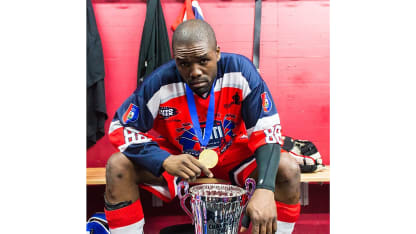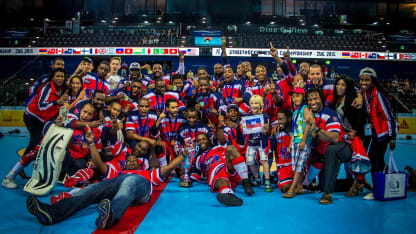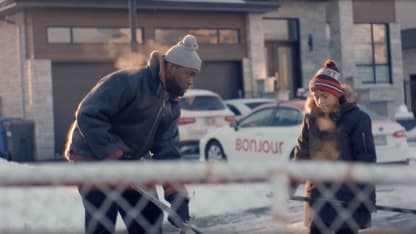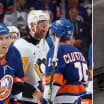Ball hockey, also called street hockey or dek hockey, is played in more than 60 countries. Nearly 40 countries belong to the ISBHF, a Prague-based organization that has hosted international competitions since 1995 and wants to make ball hockey a Summer Olympics sport.
Several NHL teams use ball hockey as a way to introduce young people to ice hockey, entice them to become NHL fans and perhaps take their game to the ice. The Washington Capitals purchased street hockey equipment for all the District's public schools and have built or refurbished 11 street hockey rinks in the District of Columbia, Maryland, Virginia, and West Virginia.
In February, the Detroit Red Wings unveiled "Learn, Play, Score," an initiative that aims to expose hockey to more than 30,000 young people in the city of Detroit through street hockey at 79 schools, 12 parks and recreation centers by using hockey as an educational tool in school, as well as by providing scholarships for hockey programs and open skate sessions at Little Caesars Arena.
The Tampa Bay Lightning have programs to provide students grades 3-5 with Lightning-logoed street hockey sticks and balls. The goal is to distribute 100,000 in five years and increase the Tampa-area registration of youth players (7-13 years old) in USA Hockey.
The Arizona Coyotes have developed a street hockey physical education curriculum to reach 700 schools and more than 500,000 students.
Haiti's ball hockey exploits inspired the formation of a Haitian ice hockey team that played a game in 2016 against a team from Lebanon, Laraque said.
"We were so surprised that there were so many black Haitian and black African people playing the game," said Bien-Aime, who played ball and ice hockey at least three times a week before rinks were closed due to concerns surrounding the coronavirus. "The feedback we were getting was, 'We're so happy that you guys won that championship, it gives us a goal."
Bien-Aime hoped that Haiti would become a perennial ball hockey power on the world stage. But like many title-winning teams, Haiti experienced a championship hangover, and moving up to the ISBHF's top pool made it even tougher. By 2019, Haiti was ranked 12th, at the bottom of the ISBHF A Pool.
"The fact that we won in 2015, people felt, 'We don't need to practice as much, we're in shape, everybody's scared of us, we'll just run it through and get to the finals,'" he said. "That wasn't the right mindset from the get-go."
Now Bien-Aime is looking ahead to the 2021 world championship in Manitoba with redemption on his mind -- body willing.
"Even though I'm old, I'm still captain," he said. "Physically, I know it's time, but I'm not ready yet."
Photos courtesy: Yanissa Grand-Pierre and Hockey 24





















